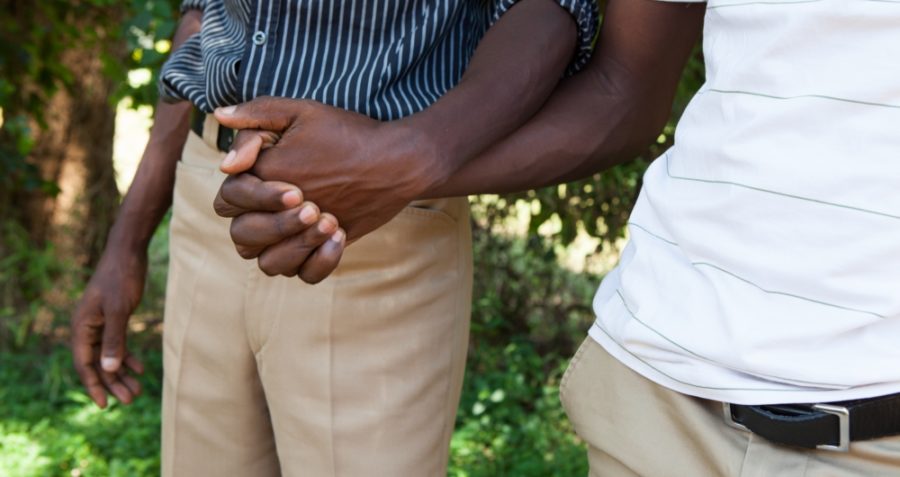Tinashe’s story: hope after persecution for being gay
 © Corrie Wingate for Frontline AIDS
© Corrie Wingate for Frontline AIDS
At the age of 14 Tinashe told his grandmother that he was gay and was kicked out of the house when his grandfather found out. In 2016, age 17, he had to flee his home in Bulawayo, Zimbabwe in fear of his life.
Tinashe* says: “I was abandoned by my mother when I was six-months-old and I was raised by strict, religious grandparents who never understood why I preferred playing with girls and not boys, and who beat me when I asked for a doll.”
When Tinashe was made homeless he went to his biological mother for help, she told him that she had wanted nothing to do with him since the day he was born. For a while, a neighbour let him sleep on her kitchen floor. Eventually he went back to his grandmother, pleading with her to let him back in her house, promising to change.
Persecuted for being gay
When Tinashe turned 15, the bullying at school became unbearable and he dropped out. He got a job at a flea market. People in his community now knew that he was gay. Women did not mind much, but men hated it.
His pastor stopped him from singing in the choir at his church, accusing him of being demon-possessed and not clean enough to minister to God’s people. That happened after his grandmother asked the pastor to pray the gay away. Tinashe then stopped going to church altogether.
One night, during a power failure, a group of men recognised him in the street and chased him all the way to his house, throwing stones at him. Tinashe was terrified, thinking: “This is it, they are going to kill me!”. He knew that reporting the incident to the police would only lead to a beating, so he decided to flee to South Africa.
Fleeing to South Africa
Tinashe fled Zimbabwe with 50 dollars in his pocket, his monthly wage from working at the flea market. On the night of 15 April 2016, a taxi driver helped smuggle him across the border into South Africa. Tinashe officially became an illegal immigrant.
But at least I was on my way to freedom, a future free of abuse, free of discrimination, free of bullying and free of death threats.Tinashe
He moved in with a friend and her boyfriend who were living in Cosmo City. He found a job at a restaurant and life started getting better. But six months later the restaurant closed down. At the same time, Tinashe was interrogated by his friend and her boyfriend about not having a girlfriend and behaving like a girl. When he finally told them that he was gay, he was once again accused of being a sinner and evicted.
“I remember that day, crying the whole night, asking myself where am I going to go? What am I going to eat? Where will I stay?” says Tinashe. “The only thing that was on my mind was for me to commit suicide.”
Life-saving phone call
What happened next, helped Tinashe change his life around. He said: “I was walking next to the road, hoping to be hit by a car, when I got a call from an old friend living in Cape Town who encouraged me not to do anything stupid, and who put me in contact with Dumisani Dube, the communications officer for GALZ [Gays and Lesbians of Zimbabwe] in Johannesburg and the founder and director for Dialogues For Change.”
Dumisani contacted Dr Louw, director of Gateway Health Institute and programme director of LGBT Asylum Assist, a project funded by the International HIV/AIDS Alliance’s Rapid Response Fund.
LGBT Asylum Assist focuses on lesbian, gay, bisexual and transgender (LGBT) refugees and asylum seekers by offering legal aid, safe accommodation, access to health care and HIV services, and assistance in finding stable employment. It is a comprehensive care and support package with the goal of preventing HIV among LGBT refugees, who often engage in high-risk sex work to survive.
A hopeful future
Because he dropped out of school Tinashe’s chance of finding well-paid, stable employment was limited – but Gateway enrolled him in a Microsoft computer training course with an accredited provider, where he earned a certificate. He also has access to the local clinic and to condoms, lube and HIV self-testing kits.
Improving the socio-economic circumstances of LGBT refugees is key to the fight against HIV in South Africa. Today Tinashe is living in a safe environment and being assisted by Gateway’s paralegal intern to apply for his Section 22 Permit, which will allow him to look for a job.
Dr Louw said: “Poverty and unemployment is a huge contributing factor to the HIV pandemic and we should do all we can to ensure refugees are educated enough to rise above their circumstances, have access to social justice and their safety guaranteed.”
Tinashe is currently interning with Gateway, assisting in the finance office to reinforce his newly acquired computer skills, and earning a monthly stipend. He is also being trained in HIV topics so he can provide support to the LGBT youth community.
Tinashe said: “If I were to get rich one day, I would love to provide funding for programmes that help empower the LGBT community.”
*name changed to protect identity
Support Tinashe received from LGBT Asylum Assist was funded by a grant from the Rapid Response Fund, which is managed by Frontline AIDS and funded by the Elton John AIDS Foundation.
This article was written as the International HIV/AIDS Alliance, before we changed our name to Frontline AIDS.
Tags
LGBTRapid Response FundSouth AfricaZimbabwe



